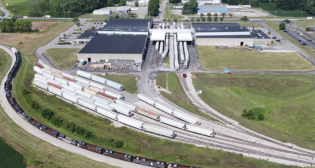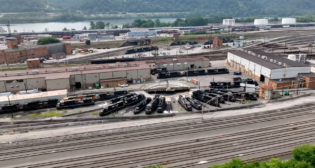
Railcar Owners Seek STB Demurrage, Accessorial Rules Changes
Written by William C. Vantuono, Editor-in-ChiefFour organizations representing private freight car owners have petitioned the Surface Transportation Board to institute a rulemaking that would update the demurrage and accessorial rules governing the railroads’ use and handling of their equipment.
The North America Freight Car Association (NAFCA), National Grain and Feed Association (NGFA), Chlorine Institute (CI), and National Oilseed Processors Association (NOPA) on July 26 submitted a Petition for Rulemaking requesting the Board “to promulgate regulations governing the use by the nation’s Class I railroads of freight railcars supplied to them by railcar owners, shippers, and other nonrailroad entities. [A]n update to the rules governing the railroads’ use of private railcars is long overdue because the railroad industry has evolved to the point that approximately 73% of the railcars in service today nationwide – approximately 1.2 million railcars—are no longer owned by railroads, but are … purchased, or leased, and maintained, by non-railroad entities at little or no cost to the railroads that use them.”
“The non-railroad entities who supply private railcars to railroads have collectively invested tens of billions of dollars to acquire the railcars through lease or purchase, and they incur additional significant ongoing costs to maintain them, in large part for their use by the Class I railroads to provide railroad freight service,” the Petitioners say. “While there are rules and policies in place by which suppliers of certain types of private railcars receive some compensation from railroads for their use of [such cars], current regulations and policies do not adequately protect this enormous investment by creating sufficient incentives for the Class I railroads to use private railcars efficiently.
“When private railcars in the possession of Class I railroads are handled inefficiently due to irregular service or other actions by a railroad that result in [such cars] being held too long in the railroad’s possession and control, the investment in those railcars is adversely affected and the business of the party supplying the railcars suffers.
“[The] petitioners propose that the Board should resolve the current imbalance by adopting a regulatory mechanism that utilizes existing principles governing demurrage and accessorial charges to provide greater incentives for railroads to utilize [such cars] in their possession more efficiently. More efficient use of … by railroads will protect the huge investment non-railroad entities have made acquiring and maintaining them, and will result in the national railcar fleet being of a more rational size to utilize existing rail system capacity and meet demand. The overall goal of this proposal … is to maximize the Class I railroads’ efficient use of private railcars without unduly infringing upon the railroads’ freight operations over their respective systems, recognizing that some level of service variability is inherent in any railroad’s operations.”
The entire Petition for Rulemaking can be downloaded here:
Following are selected points:
• [By adding a] new Part 1334 to Title 49, Chapter X of the Code of Federal Regulations (or other appropriate Chapter), the Board would establish by regulation a “private railcar delay charge” that could be assessed by a private railcar provider if a railroad exceeded an “allowable transit idle time,” defined as 72 consecutive hours of idle time at any point on a railroad’s system while the private loaded or empty railcar is being transported under a bill of lading or similar documentation between the time the private railcar is released for transportation to when it is either constructively placed or actually placed at the private railcar provider’s facility or designated location. Whether allowable transit idle time has been exceeded shall be determined by Car Location Message (CLM) Event Sighting Codes published by Railinc and CLM’s successor(s), and a private railcar delay charge may be assessed for any private railcar for which the CLM location city of CLM sighting code has not changed for more than 72 hours. The allowable transit idle time of 72 hours is far in excess of the time railroads allow for their customers to hold onto railroad and private railcars in order to allow for a reasonable level of service variability. Indeed, typical railroad tariffs today permit shippers as little as 24 hours to unload a railcar and return it to the delivering railroad. Moreover, the 72-hour time period would be calculated using processes and data already utilized in the industry.
• As proposed, the applicable charge for exceeding the allowable transit idle time would be the greater of either (i) the applicable demurrage charge that a rail carrier assesses its customers pursuant to the railroad’s tariffs or other common carrier publications for holding on to railroad-owned or leased railcars beyond the free time established by the railroad, or (ii) the applicable storage charge that a rail carrier could assess the private railcar provider pursuant to the rail carrier’s tariffs or other common carrier publications for holding onto or storing the private railcar beyond the free time established by the railroad.
• A railroad would have the ability to seek a ruling from the STB that paying the railroad’s charges for exceeding the allowable transit idle time was inappropriate in an appropriate proceeding that could include arbitration; in such a proceeding the railroad would bear the burden of proof.
• While the Board has held that demurrage charges may not be assessed when private railcars are held on private track because the railroad is not being deprived of any of its assets, the same cannot be said for the owner or lessee of [such cars] that have been loaded or unloaded but remain on a third party’s private track for an extended period of time, despite being released to the railroad to return to origin or another loading point. In that instance, the owner or lessee of the private railcar is being deprived of its asset, and the third party whose tracks are being used or blocked is being deprived of the use of its facility to receive raw material, manufacture products and ship them to its customers.”



